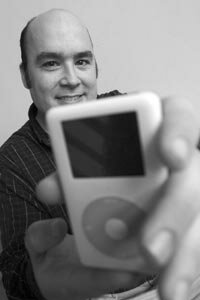Tuned in: Podcasting has town by the ears
Your iPod has probably already changed the way you listen to music, but it may also soon change the way you listen to just about everything else, thanks to a growing practice called "podcasting."
Huh? Podcasting? you're asking. What's that?
Basically, podcasting consists of little more than making personal radio content available for download by interested listenersin essence, an audio blog. But this same simplicity makes it accessible to just about anyone with a set of vocal cords– or a few CDs– regardless of whether they have the support of traditional broadcasting authorities. According to the Dallas-based Diffusion Group technological research commission, podcasting is on the verge of exploding into the public consciousness, with a 15-fold increase in popularity possible over the next five years.
Technically, there's nothing new here– podcasting has been around in one form or another for several years, and programs such as iPodder sprang up to help connect listeners on the cutting edge with the content they sought. Long before the medium began to attract the attention it has enjoyed in recent weeks, content providers ranging from right-wing pundit Rush Limbaugh to ultra-liberal news program Democracy Now had begun to offer their programming as freely downloadable mp3s.
The devil is in the details, and the catalyst here is the packaging. Unbeknownst to most casual listeners, Apple computers has just rolled out an upgrade to the popular iTunes jukebox software that automates the process of acquiring and listening to podcasts, wrapping it all in the same slick interface that has taken their paid download service to the top of the heap and sold their iPod mp3 players like wildfire.
"Most people want the easiest experience possible," says 31-year old audiophile Sean Tubbs, taking a break from fine-tuning the iTunes compatibility of his podcasting site.
Tubbs founded cvillepodcast.com in April to support the burgeoning technology at the grassroots level after realizing how his expertise could help make the technology accessible to others. "The RSS feeds are the major difference," he explains.
RSS is the same syndication technology used to bring personalized news reports to your PDA. With podcasts, instead of news, the feeds are merely alerting the receiving programs to the presence of a new installment of the series.
So far, Tubbs seems to be proudest of his role in making WNRN's popular "Sunday Morning Wakeup Call" available literally anywhere in the world; there's no telling how many remote listeners might have been introduced to The Hook's own Barbara Nordin in a recent installment.
"The plan is to eventually have all the specialty shows we run here available for podcasting," says WNRN manager Mike Friend.
"I have a podcast that I listen to– daily," says Tubbs. "It's amazing how attached you get," he adds, probably hoping to convert some listeners.
His show of choice originates in London, so it turned into a major emotional anchor after the July 7 terrorist attacks. "It was probably one of the most touching things that I've heard," he says, "because it almost put me in London."
Steve Momorella of cvilleradio.org, another participant in what Tubbs only half-jokingly calls the "podcasting gold rush," says, "It's really putting radio on its head. Once you have it, it's like you own your own radio station– except that I didn't have to go buy office space, and I didn't have to get a tower."
But where Tubbs dabbles in news, drama, and specialty radio, Momorella aggressively promotes local rock music.
"It's really cool what he's doing here; it's a great way to get music that's not already being shoved down your throat by ClearChannel," says local rock and music industry authority Andy Waldeck, who led his alt-rock Earth To Andy project to the edge of national prominence a few years back and is now one of Momorella's star participants.
"If you're on a label and someone's doing your radio marketing, great," he says. "If not, you're screwed, unless you know a DJ personally."
"I definitely don't want to be like a traditional radio station where I just play the one song from the artist," agrees Momorella. Content can be mixed or focused on a specific artist, and listeners can choose between streaming audio built into the web interface or a file which they can download to any mp3-compatible portable device.
"Especially around the university, everybody has these darned things," says Tubbs of the ubiquitous white headphones. "You can only put so much music on it, but if you can get regular programming on it– I think that's what cvilleradio.org is trying to do– it's a huge opportunity."
There's more to this than simply busting up Big Media, though.
"There's always going to be a market for moderated content," admits Tubbs. "I'm interested in collaborating with other media outlets, and I'd like to do some stuff with citizen media. I'd like to assign citizens to go do stories, but that's on a strictly volunteer basis right now."
"Journalism and the idea of traditional print and traditional radio are changing," agrees Momorella. "It's not going to go away, but now the small guy can have a voice."
And, perhaps more importantly, an audience. It appears that the Charlottesville contingent has no less than two entrepreneurs hoping to keep a trend with such far-reaching consequences grounded, locally relevant, and easily accessible.
"I don't think I could be experimenting with this anywhere else," says Tubbs confidently.

Sean Tubbs
PHOTO BY JEN FARIELLO